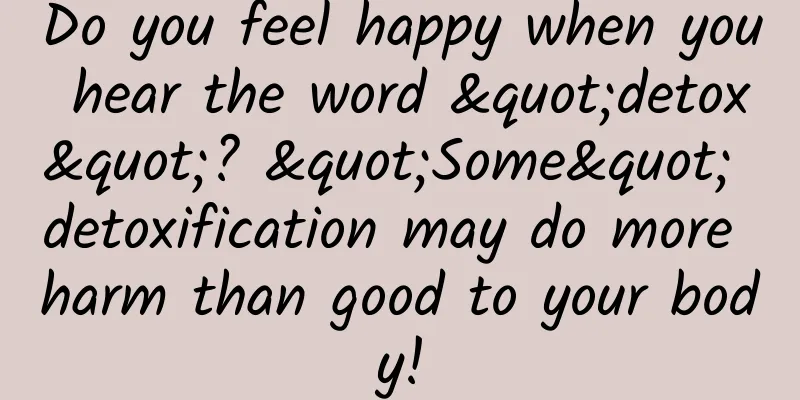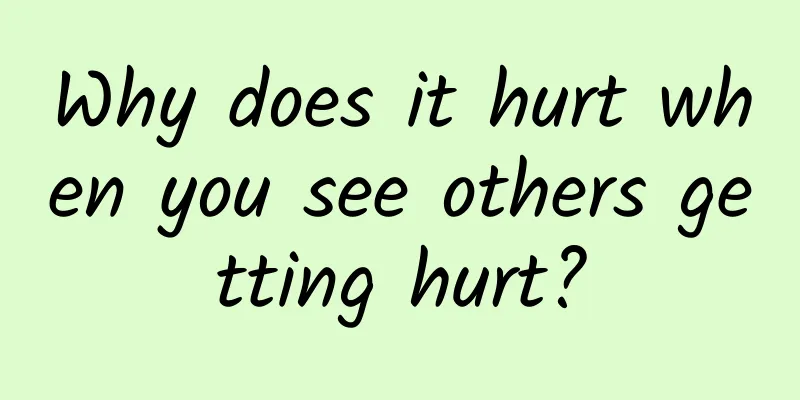Do you feel happy when you hear the word "detox"? "Some" detoxification may do more harm than good to your body!

|
Leviathan Press: In real life, except for people with gluten allergies, most people have no problem with their daily food intake. Many people mistakenly believe that there are too many toxins in the body that cannot be excreted, so when they hear the word "detoxification", they feel much more refreshed psychologically. Of course, eating less processed foods is undoubtedly the right choice, but is it necessary to do additional body detoxification on this basis? This time of year, there’s no shortage of content selling anxiety about the excess sugar or alcohol we may have consumed over the holidays: just search for “detox” or “cleansing” on social media. It’s a multi-billion dollar global industry. While it's completely normal for your body to change, and there's nothing wrong with food in moderation, you may still be asking yourself: Should I try one of these wonder detox treatments? Do they really work? Like most things involving the body, the answer is complicated. Melissa Prest, a certified dietitian with the Academy of Nutrition and Dietetics, says no high-quality studies have shown any long-term benefits from detoxes. Some may even be harmful, especially when done without medical supervision. Still, some people swear they do feel better after a cleanse — more energy, clearer thinking, less bloating. That’s not surprising, Priest says: “If someone has been eating a lot of processed foods, no fiber, very few fruits and vegetables, and now they’re replacing those foods with nutrient-dense foods, of course they’re going to feel better.” Ultimately, making some adjustments to your diet may bring benefits to your body in the short term, but even so, these changes come with considerable caveats. © Cleveland Clinic Health Essentials What is detoxification? There's no specific definition for a detox, but Priest says it generally means restricting your diet for a short period of time with the goal of ridding your body of toxins — whether they're natural byproducts like lactic acid or external factors like mercury or pollutants in seafood. Doing a detox might mean cutting out dairy or gluten for a month, drinking a liquid diet or juice for a week, or just fasting. Even something like Whole30 or the ketogenic diet can be considered a detox (cleaning your colon is one way to do it, but that’s another story entirely). © Getty Images However, the Academy of Nutrition and Dietetics, the world's largest organization of nutrition and dietetic practitioners, does not recommend detoxing. Priest said that's because the body already has its own efficient processes for eliminating toxins, mainly through the liver, kidneys and digestive system. For example, the maximum amount of alcohol that the body can metabolize in a day depends on how much alcohol a person has consumed (and how strong it is). According to a 2022 study in the journal Frontiers[1], most detoxification regimens fall into the category of “fad diets,” which typically ban certain food groups, fail to provide adequate nutrition, and are short-term changes that are difficult to maintain in the long term. Many companies that offer detox treatments tout their products as “scientifically backed.” But these research findings are likely manipulated to fit a narrative. For example, the “lemon water cleanse” has become a mainstream detox. But one study that is often cited as a beneficial detox monitored fewer than 100 participants for just 11 days.[2] "The same positive changes were seen in subjects who followed a similar calorie-restricted diet but without the lemon juice mixture," said Melinda Ring, MD, an integrative internal medicine specialist and director of the Osher Center for Integrative Health at Northwestern University Medical Center. Also, many studies are conducted on animals, and the results cannot be easily transferred directly to humans. What are the actual short-term benefits of detoxing? However, Lin doesn't rule out the potential benefits of a detox. "It's not only a mental reset for people, but it's probably more important than an actual physical reset - it gives people a sense of starting over. It can help them break bad habits. I would encourage people to do these things in a healthy way, but also realise there's a limit to how much they can actually change." It’s difficult to pinpoint exactly what a detox does to your body in the short term, as there are so many variables. Some people detox to reduce inflammation — which can be caused by foods like dairy or gluten, especially for people with intolerances. The National Institutes of Health estimates that 68% of the world’s population cannot absorb lactose effectively, and up to 7% is sensitive to gluten.[3] But reactions can be so mild that you may not even notice them — which may explain why some people feel better after cutting out these foods. These images show the dense array of microvilli within cells of the human small intestine, captured using scanning electron microscopy (left) and transmission electron microscopy (right). These tiny tissue structures form a dense, brush-like covering on the cell surface, enabling them to absorb nutrients from digested food. © Steve Gschmeissner Lin says inflammation affects a range of body processes and can lead to arthritis, gastritis and bronchitis. Therefore, even a short-term elimination of these foods can be beneficial. Certain foods or supplements, such as ginger, garlic and omega-3 fatty acids, can also reduce inflammation. If you consume more fiber, which is food for your gut microbes, you may also experience the short-term benefits of better bowel regularity, Priest adds. “We know that a meal can have an impact on someone’s microbiome,” Lin said, “so we can see some pretty immediate effects at the biochemistry and pathophysiology level of the body.” “But these benefits can quickly disappear if someone returns to drinking, eating fast food and overindulging.” You can easily get these benefits without having to spend hundreds of dollars (plus shipping and handling) on a 5-day bone broth cleanse. Ultimately, your doctor is the best person to oversee your diet and diagnose food sensitivities, and medical experts don't recommend cutting out any food groups if you don't have allergies. What are the benefits of intermittent fasting? Intermittent fasting is another popular detoxification strategy, which usually involves abstaining from food during an 8- or 12-hour window. This can also trigger some short-term changes in the body. Most notably, not feeding the body triggers a process called autophagy, in which cells clean up their old and damaged components. The body already does autophagy constantly, but fasting can trick the body into doing more of it. This isn't necessarily a good thing. This enhanced transmission electron microscopy image shows a cell undergoing autophagy, a natural process by which cells get rid of old and damaged cells. Fasting helps induce autophagy, but it is unclear whether it overdoes the cleanup and even throws away some beneficial material. © Science Photo Library “Autophagy does play a role in cleanup, and if you increase it, you might have better outcomes. But we don’t know whether, in the process of increasing autophagy, you’re overdoing it and throwing away good stuff,” says endocrinologist E. Dale Abel, chair of the department of medicine at the David Geffen School of Medicine. Recent studies have suggested that autophagy could be used to treat diabetes and fight cancer cells[4]. But Abel says it is not yet clear whether inducing autophagy through fasting has the same benefits, and this will require longer follow-up studies in more people. Intermittent fasting can also help people more quickly reach the metabolic state of ketosis, in which the body burns fat instead of glucose in the blood for energy. This is the ultimate goal of the ketogenic diet, which includes lots of fat, moderate protein, and few (or no) carbohydrates. The jury is still out on the safety and long-term benefits of the ketogenic diet ,[5] but a 2022 review in the journal Nutrients linked ketosis to improved cognition in people with Alzheimer’s disease. “This state of ketosis is associated with a feeling of mental clarity and increased energy. That’s part of why people do feel good on a ketogenic diet,” Lin says. However, Abel said that for some people, a side effect of the keto diet may be brain fog. The dangers of detoxification In rare cases, detoxification can have extreme or even life-threatening effects. For example, eating too many carrots or other foods high in vitamin A can lead to headaches and osteoporosis. Excessive amounts of green leafy vegetables, which are high in oxalate, can also damage the kidneys.[6] Other cleanses, especially those that restrict calorie intake, may have the opposite effect than intended. "The body likes to make sure it can keep going, so it does all sorts of things to stay alive," Priest says. "It slows down its metabolic rate so it can conserve the energy it gets." © The Washington Post Therefore, when returning to your daily calorie or nutrient levels after a detox, you may actually gain weight. "Because of your slower metabolic rate, anything left over may be converted to fat or stored for use again later," adds Priest. People may try different cleanses or diets, but extreme swings can be harmful to the body. In people with diabetes, you can actually see differences in the DNA of those who try extreme diets and those who maintain a healthier diet. “Going from one extreme to the other can also be harmful to you,” Abel said. So doctors and dietitians give the usual advice: Stay hydrated and eat enough fruits, vegetables and fiber regularly, not just during a few weeks in January. “That’s always the approach I prefer: making more long-term and sustainable changes,” Lin said. By Christina Sterbenz Translated by tamiya2 Proofreading/tim This article is based on the Creative Commons License (BY-NC) and is published by tamiya2 on Leviathan The article only reflects the author's views and does not necessarily represent the position of Leviathan |
<<: There are actually “counterfeit goods” in the nut gift package?
>>: Today’s Rain|Spring rain is as precious as oil, but why is it so precious?
Recommend
Observed! This is the oldest black hole ever discovered →
Webb telescope detects oldest black hole yet The ...
Is this Apple’s “disaster” point or turning point?
[[251089]] Image source: Visual China Suppliers w...
Are you healthy? Just look at your urine! Be careful if you have these symptoms when urinating!
It is said that most people go to the toilet Take...
How did Momo gain tens of millions of users in just one year?
In June 2011, Boss Wang (Wang Li called himself B...
This "lotus leaf" is not actually a plant!
Speaking of "ceramics", there is no dou...
Musk promoted Tesla, but 3025 electric vehicles were removed from the shelves in China on the same day
At noon on July 6, Beijing time, Musk showed the ...
Case analysis: How does Juewei Duck Neck do social marketing?
If you like to eat duck necks and braised food, y...
"Healthy through eating" series | Where are nitrites hidden? Eating this way can reduce your intake
In recent years, the media has repeatedly reporte...
Game planner’s analysis: Why is Honor of Kings so addictive?
Why do college girls have trouble sleeping every ...
Deadly camouflage, color magic, how "cunning" are the insects in the rainforest?
In the remote and mysterious tropical rainforest,...
Wei Jianjun became an Internet celebrity at the age of 60 and jumped to the front stage for Great Wall, but is Great Wall really just lacking "traffic"?
Before April this year, how much did you know abo...
How to cultivate APP into a "demon god" among brands
Pick up the three major brand elements: find diff...
Douban Photo Album Collection
Source code introduction The source code of Douba...
Love Course 5000G: 2021 Complete Set of Teaching Methods for Picking Up Girls (with Full Course Catalog, Updates Included) Baidu Cloud Download
We have integrated hundreds of emotional teams fr...






![[Valuable Experience] Android Performance Optimization: Memory Optimization Practice](/upload/images/67ebda82b13d8.webp)


